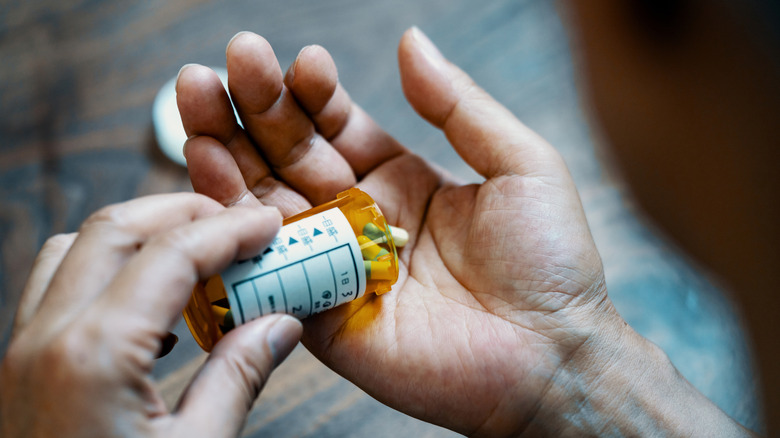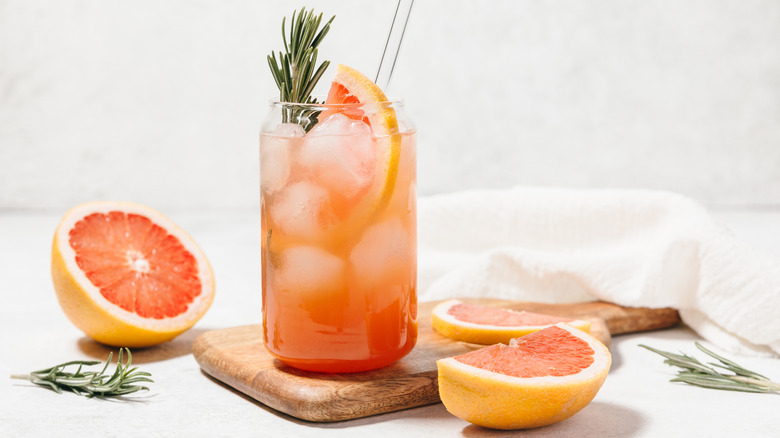The Fruit Juice That Could Cause An Overdose While Taking Antibiotics
Antibiotics are commonly prescribed to treat bacterial infections such as urinary tract infections (UTIs), strep throat, and ear infections. These medications work by disrupting the bacteria's ability to grow and multiply and interfering with protein synthesis. This is why, unlike a cough or cold medicine, antibiotics don't provide immediate relief for your infection. It often takes a few days before you start feeling better as the medication gradually reduces the bacterial load in your body.
Your antibiotic treatment can last for up to two weeks, depending on the type of infection and the specific antibiotic prescribed. It's important to follow your doctor's instructions regarding dosage and whether to take the medication with food. Some antibiotics are best absorbed on an empty stomach, while others may cause stomach irritation if not taken with a meal.
Another consideration is whether your antibiotic interacts with grapefruit juice. If you drink grapefruit juice while taking erythromycin, you might boost the amount of the antibiotic in your bloodstream by up to 52%, according to a 2001 study in the European Journal of Clinical Pharmacology.
Why does grapefruit juice affect drug metabolism?
It's not just erythromycin that grapefruit juice affects. According to the Food & Drug Administration, grapefruit can interact with medications such as statins, high blood pressure medications, antihistamines, corticosteroids, and anti-anxiety drugs. However, not all medications in each drug category are affected. The antibiotics clarithromycin and doxycycline aren't impacted by grapefruit juice.
Your body uses an enzyme in your small intestine called CYP3A4 to break down many medications. Some people naturally have more of this enzyme in their bodies, which could partially explain why some medications work more (or less) effectively than others. Grapefruit juice inhibits this enzyme from doing its work, causing more of the drug to enter your bloodstream.
For some drugs, grapefruit juice has the opposite effect. Drug-transporting proteins can become blocked by grapefruit juice, which can result in the medication being less effective. For example, fexofenadine (Allegra) uses these drug transporters to enter your cells. Orange juice, apple juice, and grapefruit juice shouldn't be consumed while taking fexofenadine.
Can you overdose on antibiotics?
While 50% more of an antibiotic in your system might sound frightening, it's rarely dangerous, according to the Poison Control Center. If you do happen to drink grapefruit juice while taking erythromycin, you don't need to go to the hospital. Too much of an antibiotic in your system could cause side effects such as an upset stomach or diarrhea. You should make sure to drink plenty of fluids. It should also be noted that while only six healthy men were involved in the 2001 European Journal of Clinical Pharmacology study, no side effects were reported.
Poison Control did emphasize that you shouldn't take antibiotics without a prescription. A child accidentally taking an antibiotic isn't a concern, but antibiotics shouldn't be given (or taken) for viruses or fungi. Antibiotics can't knock out viruses that cause colds or sinus infections, and frequently taking antibiotics can wreck your digestive health. They additionally noted that you should always take your full course of antibiotics even if you're feeling better. The bacteria could still be in your system and come back.


